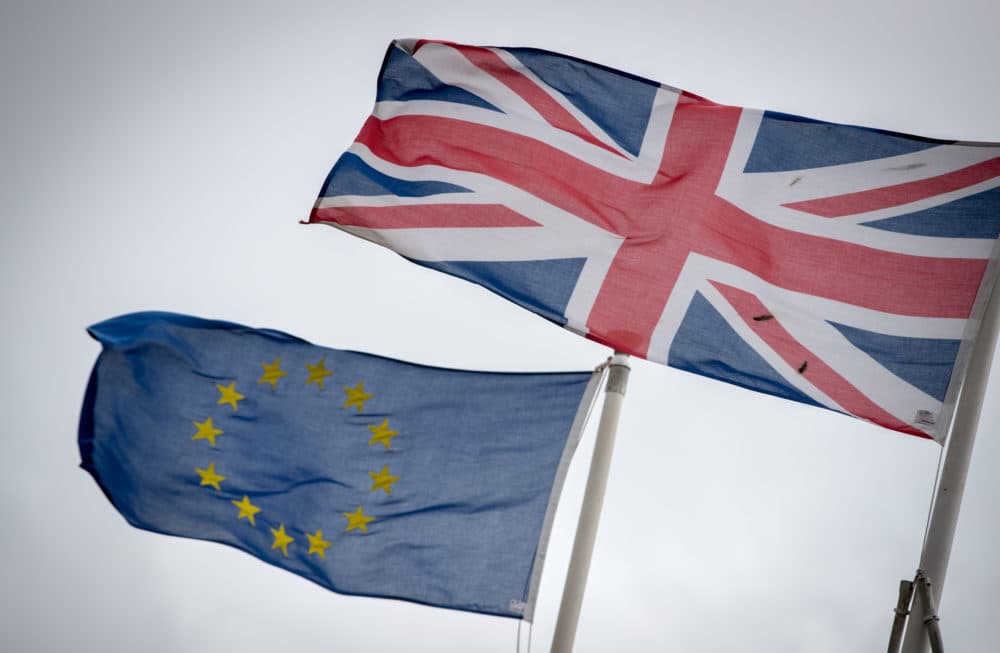Advertisement
Brexit: Before The Breakup
These Conservative Members Of Parliament Are Split On Prime Minister May's Brexit Plan

Prime Minister Theresa May is out with a long-awaited deal to break off relations with the European Union. But she'll have to get it through Parliament first.
John Redwood (@johnredwood) and Kenneth Clarke, both members of Parliament and of May's Conservative Party, have different takes on the way the prime minister should proceed.
While Redwood says May's plan of moving forward with Brexit prevents Britain from being an independent country and would cost a fortune, Clarke argues that voting to leave the EU was a mistake to begin with, and will hurt Britain economically and politically in the coming years.
"The 45 years of [EU] membership have seen Britain's political standing in the world — and our ability to influence events, look after for our interests, defend our values — [grow] immeasurably, and we're walking away from all that," Clarke tells Here & Now's Jeremy Hobson.
According to Clarke, he and other MPs are trying to settle on an agreement that would withdraw the country from the Brexit plan. "But that's all punctuated by all sorts of rouse, personality clashes, political events, votes in the House of Commons," he says.
Interview Highlights
On May's plan and the people who supported the "leave" campaign
John Redwood: “Well, I don't think her plan is even going to get through the European Union. It's quite clear that the Chequers plan was stillborn on arrival. As far as the European Union is concerned, you can't cherry pick from the single market, you can't be half in the market and half out of the market. We now seem to be looking at a worse series of proposals from the point of view of those of us who just want the U.K. to be a normal, independent country again, in that it looks as if they are considering a withdrawal agreement, which would impose a 39 billion super tax on the United Kingdom in return for another 21 months of talks about how and when we might eventually stagger out of the single market and the Customs Union.
"Anybody who tells you that they're confident they know what's going to happen is deceiving themselves. I have never seen a bigger shambles in all my life."
Kenneth Clarke
"17.4 million people — the majority in the referendum — voted to leave. We voted to leave not just the European Union, but we voted to leave its so-called single market and its so-called customs union. Both the 'remain' campaign made that clear it would be the result of voting to leave, because they thought that was bad news, and the 'leave' campaign made it clear we'd be leaving the single market and the customs union, because we think it's great news, because we don't think they work at all well.
"There are around 100 of us who take the eurosceptic view that we should just leave and that we don't wish to sign a penal withdrawal agreement, and then there are about 15 Conservative members of parliament who strongly want to stay in the whole thing and deeply regret the verdict of the British people in the referendum, who also are hostile to this particular proposal."

Kenneth Clarke: "Anybody who tells you that they're confident they know what's going to happen is deceiving themselves. I have never seen a bigger shambles in all my life. I don't think the principle party is engaged [or know] exactly what's going to happen.
"There are a handful of hard-line euroskeptics in Parliament, who seem to think no deal is positively desirable. But the chances of it happening by accident are going up week by week with every event that occurs, and the main problem obviously is we're getting desperately short of time."
On how Clarke thinks the U.K. should go about preparing for the official Brexit date on March 30
Clarke: "The one thing that I think we've certainly got to get is an agreement that so far as investments in trade, our economic relationships and our security and other relationships [are] concerned, it's a transition period during which time nothing changes.
"I think [people who support Brexit] don't want hopeless disruption at borders … and all the crazy things that would happen if we literally had no legal framework at all in place on March the 30th. No one in their right mind normally changes any businesslike arrangements until everybody's clear what we are changing to. ...
"Obviously my preference would be to stop it, but I'm rather pessimistically assuming that we can't stop it. The political class as a whole have condemned themselves to being bound by it. All the politicians signed up and swore that they would obey the voice of the people — all thinking that 'remain' was going to win. Having signed up, so many MPs would have to go back to their own genuine opinions in the national interest to stop it, and they would provoke a very nasty backlash from hard-line euroskeptics."
Advertisement
On how leaving the European Union will affect the Irish border and the U.K. more generally
Redwood: "Nothing would happen to the Irish border with no deal on our side. The British government would continue with similar border arrangements to the ones we have at the moment. First myth: It is already an international border. It is a vast border. There are different levels of sales tax on our side to the Irish side, so there have to be sales tax adjustments. It's an anti-terrorism border — there has to be a lot of police cooperation.
"If the European Union wishes to impose all sorts of barriers on the Irish side, that is up to them, and that's something which the Republic of Ireland, as a subject member state of the European Union, will have to sort out with the European Union.
"For 45 years, they had it their way, and I had to put up with membership of the European Union. ... We've now had a fair vote the other way. So it's my turn now to have what I want with the many millions who agree with me."
John Redwood
"The European Union has also made clear, that in practice, if we just left, they would not want to impose new barriers on their side of the border, and I would advise them not to. In terms of international trade, it's a very unimportant border — it's a border that matters to the people who live near it, but it's not a big trade border. The big trade borders are primarily the ones across the channel between France, Belgium, Holland and the United Kingdom."
On how Redwood views those who supported the "remain" campaign
Redwood: "I'm a democrat, and I respect their right to disagree with me. I've argued this case with them over many years. For 45 years, they had it their way, and I had to put up with membership of the European Union, and I accepted that because that was the result of democratic votes, and I assume many of those will agree with me that we've now had a fair vote the other way. So it's my turn now to have what I want with the many millions who agree with me."
"The angry, protesting, disappointed populist part of the population is rejecting the old governing class ... and in Britain, the European issue just brings that out to the full."
Kenneth Clarke
On why there's so much disagreement within the Conservative and Labor parties over how to move forward with Brexit
Clarke: "It obviously cuts across the usual ideological, philosophical things that determine the difference between the center-right, center-left here. Now, both parties are hopelessly split, not into two factions — there are multiple factions in the Conservative Party, multiple factions in the Labor Party. The continued existence of both establishment parties must be in some doubt. although both sides now strive to keep going.
"I mean, it's not unusual. This is happening in every western democracy. The Americans have still got the Republicans and the Democrats. When I look at them, that's not the Republican Party as I recall it, and that's not the Democrats as I recall them. The angry, protesting, disappointed populist part of the population is rejecting the old governing class with its center-right bloc and its center-left bloc, and in Britain, the European issue just brings that out to the full."
Peter O'Dowd produced and edited this interview for broadcast. Jackson Cote adapted it for the web.
This segment aired on November 14, 2018.
